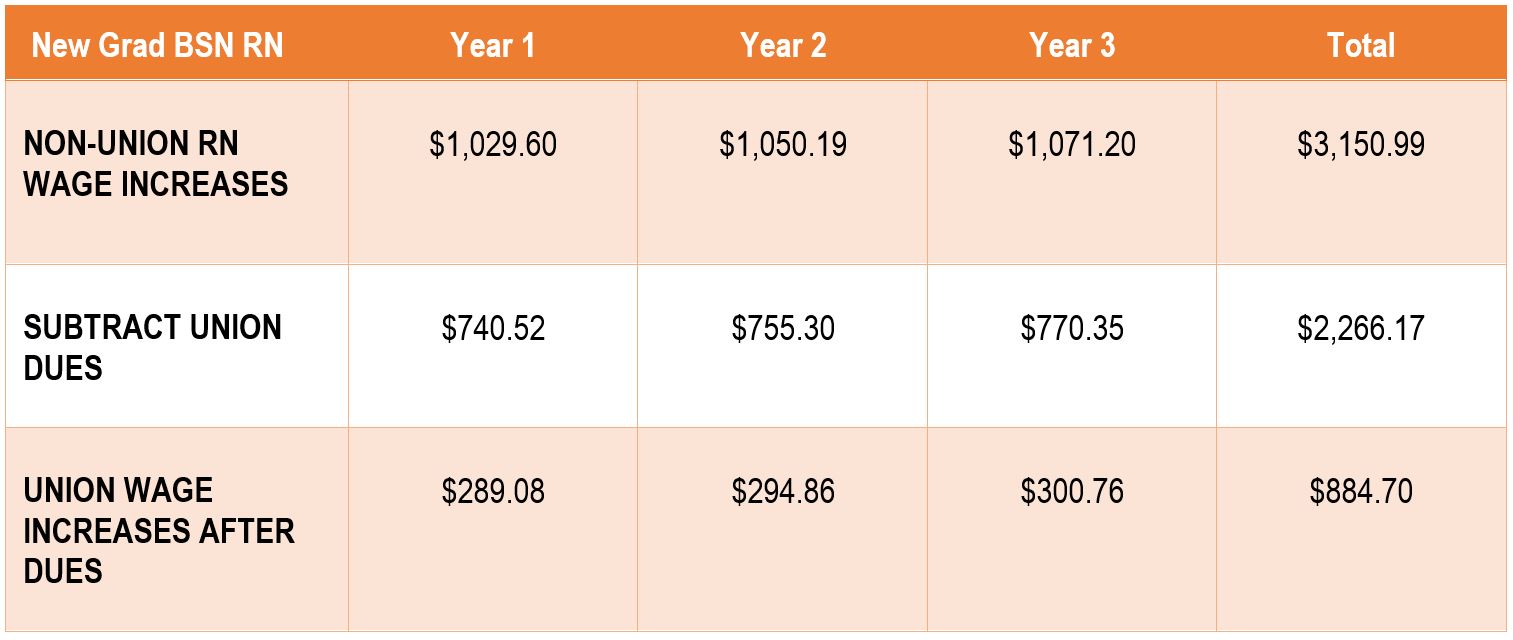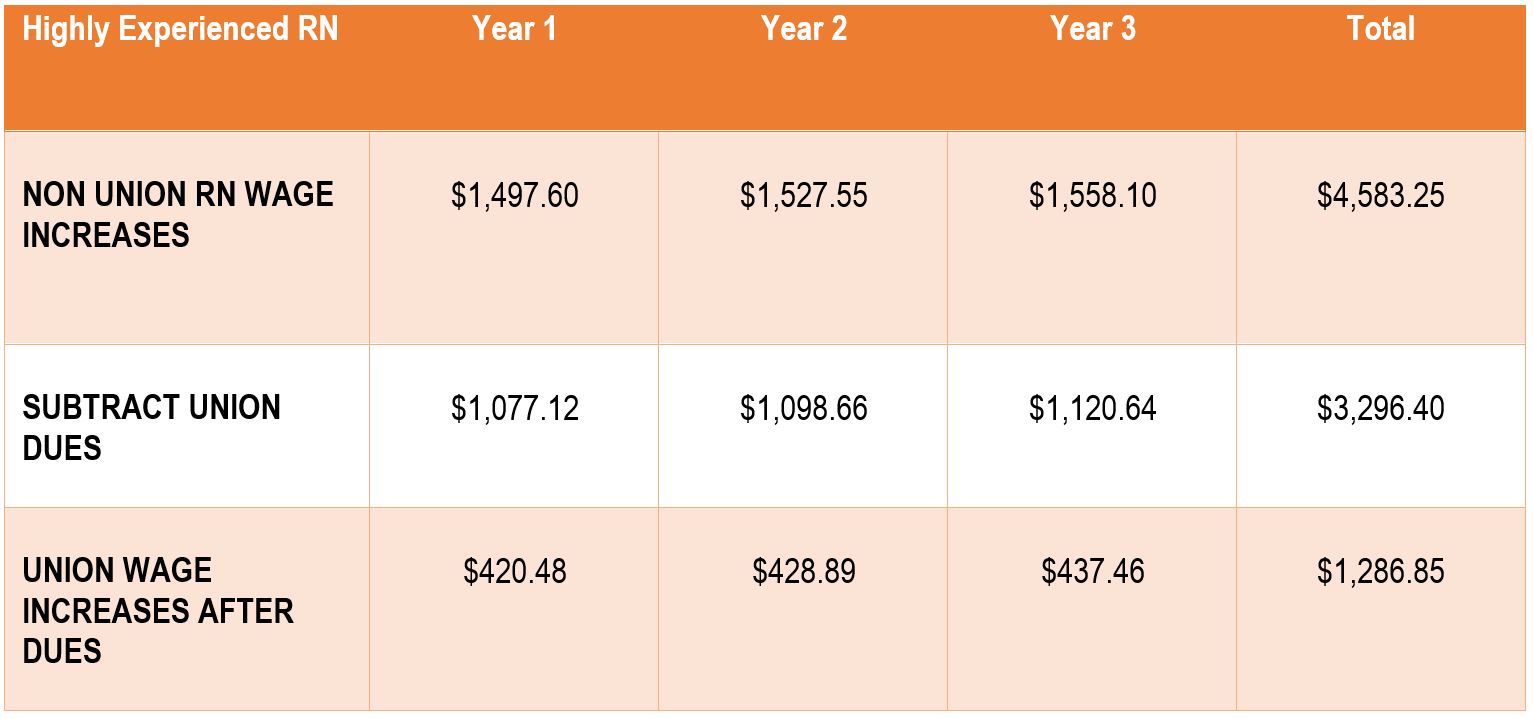Additional FAQs – Nurse Information
When it comes to the subject of a union, Riverside leaders want you to make an informed, personal decision based on facts. Some additional frequently asked questions have been addressed below:
➡ Would staffing automatically improve if there was a union at Riverside?
No. In fact, the presence of a union and a requirement that all nurses pay union dues could negatively impact our ability to recruit and retain nurses.
We continue to work very hard to recruit and hire so we can fill existing nursing vacancies at Riverside. On the recruitment front, we have implemented several strategies to attract qualified candidates; these include:
- Enhanced utilization of social media to promote job openings,
- Video interviewing, and,
- Referral bonuses for RN’s and CNA’s
We also implemented measures to reduce workloads and allow nurses and nurse assistants to spend more time with patients. For example, the Central Transport Department now assists with transporting patients to tests and discharge, and we’ve hired Patient Safety Partners to assist with sitting.
All of these measures have a positive impact on staffing and our existing policies to follow all staffing regulations already in place in Illinois.
➡ What have we done to address staffing in terms of open positions?
Our recruitment team has been working hard to fill our open positions across the Riverside continuum. As a recap, the chart below outlines our external hires along with internal transfers and promotions from September 1, 2020 to March 1, 2021.

In addition, the referral bonus program assisted us with two of our RN hires and 5 of our CNA hires; so this has truly been a team Riverside effort!
➡ Would my work schedule automatically improve if there was a union at Riverside?
No. Unions tend to prefer that all decisions regarding things like scheduling be based on seniority. These types of rigid work rules might also prevent the kind of direct involvement our nurses currently enjoy in the scheduling process.
Today, Riverside nurses widely utilize self-scheduling. This means we have the flexibility to work with frontline staff to ensure their individual needs and staffing preferences are addressed and considered.
➡ Is it true that nursing strikes are rare?
No. In fact, the National Nurses United/National Nurses Organizing Committee (NNU/NNOC) has led nurses out on strike more than any other union representing RNs. In recent years, the NNU/NNOC has led nurses out on strike over 140 times (which includes the NNU/NNOC’s 2019 strike at the University of Chicago Medical Center).
If a union calls a strike, the union is required to first give the hospital a 10-day notice. This 10-day notice allows the hospital time to make preparations to ensure uninterrupted safe patient care (e.g., stop admissions, arrange for the transfer of patients, or arrange for temporary replacement staff). You can imagine the disruptions a strike – and even just preparing for a strike – can cause for the patients, families and staff who rely on us to care for their loved ones. They rely on us. They are our family, our friends, and our partners. We never want a strike at Riverside.
➡ If there is a strike, do we get paid? And would a strike affect our benefits?
Striking nurses do not receive a paycheck from the hospital, nor do they typically receive strike pay from the union. Depending on the duration of a strike, striking employees could have the option to continue their benefits through COBRA. However, COBRA rates for insurance are significantly higher (up to 102% of the employee plus employer cost) than full-time and part-time employee premiums. For example, the total cost for a full time employee in the Enhanced HSA plan is $933.92 per pay period. The employee pays $110 per pay period, and Riverside pays the remaining $823.92. Under COBRA, the employee would be responsible for the full amount plus 2% (or $2,063.96 per month).
➡ Wouldn’t we automatically make more money if there was a union at Riverside?
No. Union organizers can promise you anything – but the truth is there are no guarantees in collective bargaining.
At Riverside, we are committed to providing all employees with fair and competitive compensation. This is why we conduct regular salary and benefit market surveys. Increases to pay ranges generally occur with our performance year cycle and are generally effective in July each year. In fact, plans are already in place to increase the CNA and RN ranges in July 2021.
Even in the most difficult of financial circumstances of 2020, while other hospitals were not providing pay increases or 401K matches, Riverside employees were provided both the recognition payment (in May) and salary increases (in September). These increases are a testament to our commitment to provide fair and competitive compensation that recognizes and rewards your contribution to our success.
➡ I don’t think union dues are that expensive. What’s the big deal?
Mandatory union dues payments can impact take home pay. NNU/NNOC dues are 2.2 times the individual member’s base hourly rate per month, not to exceed $116.27 per month (or $1,395.24 per year).
For example, a new grad nurse would be expected to pay approximately $750.00 per year, while a very tenured nurse would be expected to pay approximately $1,10.00 per year. At either end of the spectrum, union dues payments are significant, considering there are no guarantees you would get any more than you have now.
➡ What is the difference between union and non-union compensation?
One big difference is how union dues payments can impact take-home pay. The chart below shows what a non-union full-time new graduate BSN nurse with a base rate of $27.50 per hour might receive if the employee received a 2.0% wage increase each year (over three years):
The chart below shows what a unionized full-time (.9 FTE) new graduate BSN nurse with the base rate of $27.50 might receive if the employee received a 2.0% wage increase over 3 years but was also required to pay union dues (2.2 times base hourly rate per month).

Union dues payments can impact the take-home pay of long-term employees as well. Let’s take a look at wage increases for a very experienced full-time (.9 FTE) Riverside RN making a base rate of $40.00/hour, and the impact if this nurse was required to pay union dues (2.2 times base hour rate per month). As the table below indicates, if this employee received 2.0% increases in each of three years, but his/her base salary would increase by over $4,500.00.

As you can see, the union employee takes home a lot less ($3,296.40 less over three years). Experienced nurses who make more money pay more union dues.

